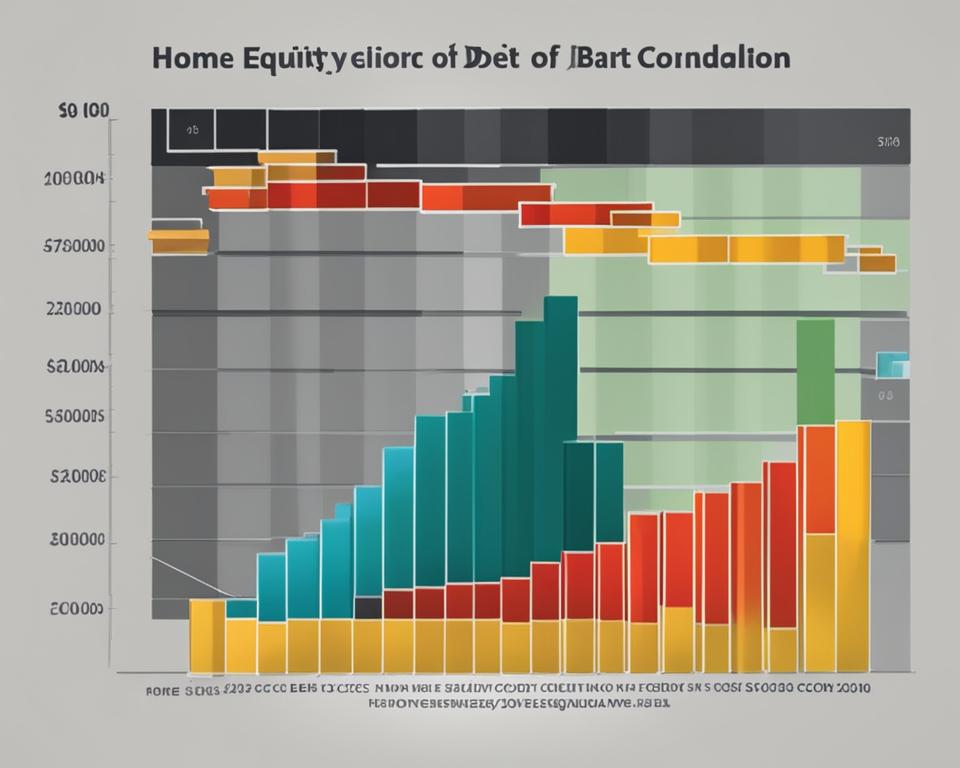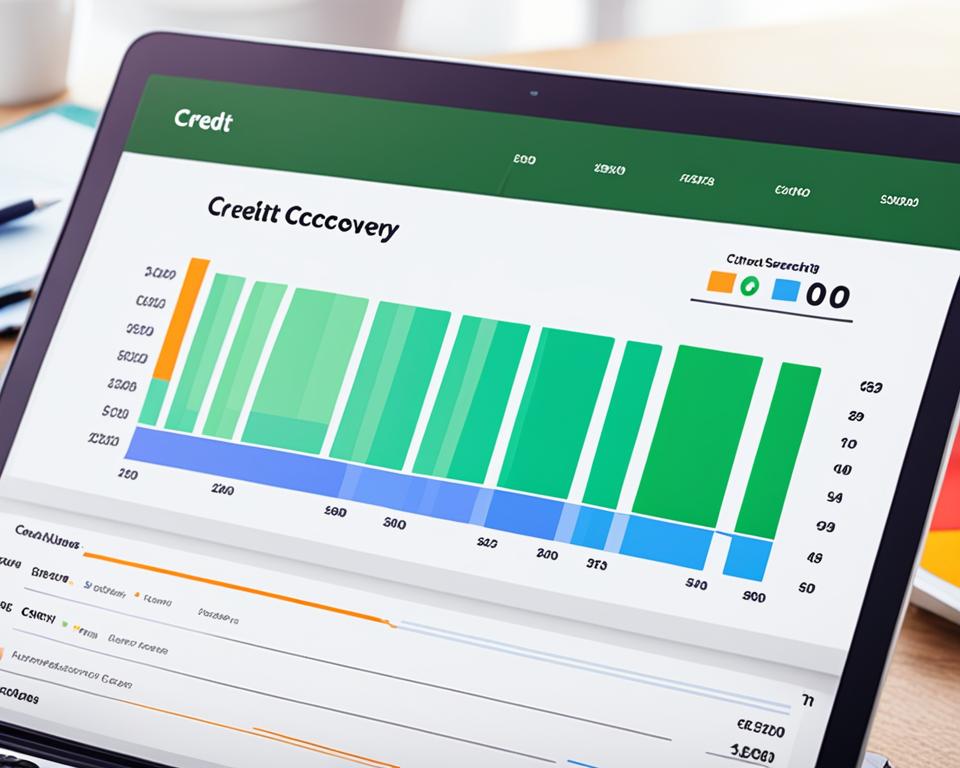Grasping the intricate dance between debt consolidation and credit score fluctuations is a crucial step for those aiming to enhance their financial health. Debt consolidation — often seen as a beacon of hope for those battling multiple debt fronts — can indeed streamline your repayment process. But it carries its own set of complexities when it comes to the affect on credit score. While the initial touch of consolidation may lead to a dip in scores, its thoughtful deployment could pave the way for credit rehabilitation and a healthier financial rhythm.
Key Takeaways
- Debt consolidation could momentarily lower credit scores due to new credit inquiries and account ages.
- Streamlining multiple debts into one can simplify repayments, leaving less room for error and potential score benefits.
- Maintaining consistent, on-time payments post-consolidation has a favorable long-term impact on credit scores.
- A lower credit utilization ratio achieved through consolidation improves financial leverage and creditworthiness.
- Regular monitoring of credit score changes is essential for those engaging in debt consolidation strategies.
Understanding Debt Consolidation and Credit Score Dynamics
As individuals strive for financial health, comprehending the relationship between debt consolidation and credit score dynamics becomes paramount. This section delves into how merging multiple debts into a single payment can influence one’s creditworthiness and overall economic stability.
What Is Debt Consolidation?
Debt consolidation is the process of combining several debts—often stemming from various sources such as credit cards, medical bills, or personal loans—into one manageable loan or balance. This strategy is frequently employed through financial products like personal loans or balance transfer credit cards. The overarching goal is to simplify monthly payments, secure lower interest rates, and create a clear pathway out of debt.
- Personal Loans: A fixed-term loan from a bank or financial institution.
- Balance Transfer Credit Cards: Credit cards that offer low introductory rates for transferring existing balances.
The Role of Credit Scores in Financial Health
Credit scores are a critical indicator of an individual’s financial health, influencing the ability to secure loans and the terms at which they are granted. Effective debt consolidation can contribute positively to credit score dynamics. When properly managed, debt consolidation has the potential to:
- Improve payment timeliness.
- Decrease credit utilization ratio.
- Build a consistent payment history.
Such measures foster a stable and sound financial foundation, enhancing a person’s ability to navigate the landscape of personal finance with resilience and foresight.
Immediate Effects of Debt Consolidation on Credit Scores
When individuals take the step to consolidate their debts, it’s essential to understand the immediate effects this can have on credit scores. Actions taken in this financial maneuver—such as applying for new credit lines—can initiate changes to one’s credit report that are noteworthy.
Impact of New Credit Inquiries
New credit inquiries, often referred to as hard inquiries, occur when financial institutions conduct a thorough check to determine a candidate’s creditworthiness. This necessary step can result in a slight, temporary reduction of the credit score. The FICO scoring model reveals that such effects may last up to 12 months, although the inquiry remains on the credit report for two years.
Effects of Opening New Accounts
Opening a new account for the purpose of consolidating debt can also lead to a dip in one’s credit score. Such a move can lower the average age of credit accounts, a factor considered in credit scoring algorithms, thereby painting the consumer as a higher credit risk albeit briefly. A new credit account can elevate the debt consolidation impact on credit, which is crucial to note for those seeking to maintain a robust credit profile. However, it’s important to recognize that a timely and disciplined repayment strategy following consolidation can significantly outweigh these initial credit score concerns by lowering credit utilization ratios over time.
Long-Term Advantages of Debt Consolidation for Credit Health
The journey towards restoring one’s financial wellbeing often entails exploring various debt management techniques. Among them, debt consolidation stands out due to its capacity to enhance credit health over time. While the initial phase might trigger a dip in one’s credit score, it’s the long-term advantages that provide the most significant promise for sustainable financial stability.

One of the most compelling benefits of debt consolidation is its ability to decrease credit utilization rates, a crucial factor in credit score algorithms. By merging multiple high-interest accounts into a single debt with a lower interest rate, borrowers can not only simplify their payments but also possibly gain access to a higher credit limit, consequently driving down their utilization ratio.
Furthermore, consistent, on-time payments post-consolidation are instrumental in building a robust payment history, which accounts for a significant portion of a credit score. By focusing on timely repayment, individuals leverage debt consolidation as a tool for crafting an admirable track record of financial reliability. This conscientious approach is a cornerstone in fostering long-lasting credit health.
| Before Debt Consolidation | After Debt Consolidation |
|---|---|
| Multiple debt accounts with varied interest rates | Single account with a lower, consolidated interest rate |
| High credit utilization across accounts | Lower overall credit utilization |
| Complexity in managing several payments | Simplified payment schedule |
| Greater risk of late payments | Structured repayment plan enhancing timeliness |
Ultimately, debt consolidation can set the stage for a brighter financial future. By reducing the amount paid in interest over time and offering a streamlined method for managing debt, it not only guards but can potentially elevate one’s credit score. Thus, debt consolidation is more than just a short-term fix; it’s a strategy that can lay down the groundwork for ongoing credit health and long-term fiscal prosperity.
Will debt consolidation affect my credit score?
Individuals considering debt consolidation are often concerned about the debt consolidation impact on credit rating. It’s a multifaceted issue where different factors come into play, influencing one’s financial picture in varying degrees. Initially, engaging in debt consolidation can affect your credit score negatively due to the credit checks applied upon applying for a new loan, which are known as hard inquiries. These inquiries can lower credit scores by a few points.
In the short term, opening new accounts for the purpose of consolidating debt can also reduce credit scores. Why? Because they decrease the average age of your credit accounts—an important factor in the evaluation of credit scores. However, this is often a temporary setback.
In contrast, debt consolidation offers long-term benefits that could outweigh these immediate concerns. For instance, if debt consolidation leads to a lower credit utilization rate—another significant component of your credit score—and facilitates the ability to keep up with regular, on-time payments, credit ratings can improve over time. Hence, the precise answer to the question “Will debt consolidation affect my credit score?” depends largely on individual financial behavior post-consolidation.
Below is a detailed table that outlines the potential effects of debt consolidation on credit scores:
| Factor | Short-Term Impact | Long-Term Impact |
|---|---|---|
| Hard Inquiries | Temporary dip in credit score | Minimal impact as score rebounds over time |
| New Credit Accounts | Decrease in the average age of credit, temporary dip in credit score | May lead to improved credit mix and potential score increase as account ages |
| Credit Utilization Ratio | Potentially unchanged depending on transferred debt amount | Possible improvement with maintained lower credit balances |
| Payment History | Unchanged | Improvement with consistent on-time payments, leading to credit score increase |
To summarize, while immediate effects such as new credit account additions and hard inquiries from applications may temporarily lower your credit score, responsible use of debt consolidation can potentially help build your credit profile. It’s not a clear-cut outcome, and careful consideration should be taken to ensure that debt consolidation is aligned with one’s financial goals and capabilities.
Comparing Debt Consolidation with Other Forms of Debt Management
Understanding the debt consolidation impact on credit requires a comparison with other debt management alternatives. Various strategies exist, each with nuances that cater to the diverse financial profiles of individuals facing debt. While some opt for structured debt consolidation, others might find success in approaches that involve behavioral adjustments and creditor negotiations.
For example, debt consolidation can simplify finances by merging multiple debts into a single monthly payment, often at a reduced interest rate. However, it’s important to remember that while this might decrease overall monthly payments, it can also extend the length of the repayment period. Moreover, the reduction in credit utilization and the simplification of payment schedules can positively influence credit scores in the long term.
In contrast, strategies like the debt avalanche or snowball methods do not consolidate debt but rather focus on payment priorities. These methods often reward individuals with quick psychological wins, encouraging the reduction of debt balances one step at a time, which may lead to a different kind of impact on one’s credit.
Additionally, non-profit credit counseling agencies present an alternative by offering debt management plans. These plans often work by negotiating lower interest rates and payments with creditors, and while they do not directly involve taking out new credit, they do provide structured relief without the initial credit score drop that might come from opening a new line of credit.
When comparing debt consolidation and other debt management strategies, it is paramount to consider the individual’s financial situation, along with how each approach might uniquely affect their credit ratings.
Here’s a closer look at key differences between these debt management techniques:
| Strategy | Focus | Credit Impact |
|---|---|---|
| Debt Consolidation | Single Payment, Reduced Rate | May initially lower score, potential long-term benefits |
| Debt Avalanche | High-Interest Debts First | No direct consolidation, can reduce total interest paid |
| Debt Snowball | Small Balances First | Motivational wins, may not save on interest |
| Credit Counseling | Negotiated Payment Plans | Aids budgeting without new loans, minor credit impact |
Ultimately, each debt management method serves a distinct purpose and possesses its own set of implications on an individual’s credit and finances. Whether consolidation is the appropriate path hinges on personal financial goals, existing debt obligations, and how the individual anticipates these strategies to resonate within their unique economic context.
Strategizing Debt Repayment: Beyond Consolidation
Exploring debt repayment strategies is crucial for those aiming to free themselves from the weight of financial obligations. Apart from consolidating liabilities into a single payment, there are other noteworthy methods that can efficiently curtail debts — amongst these are the debt avalanche and debt snowball strategies. Understanding and applying these tactics can substantially aid in achieving fiscal freedom while positively affecting one’s credit score.
Debt Avalanche Method
The debt avalanche approach is particularly effective for individuals steeped in various high-interest debts. By prioritizing the repayment of debts with the highest interest rates first, this method can lead to significant savings over time. To facilitate the debt avalanche strategy, listing out all debts from the highest to lowest interest rate is a pivotal first step. As minimum payments are maintained across all accounts, the focus is to allocate additional funds to the debt with the highest rate. Once that debt is extinguished, the freed-up capital is routed to the next highest, and so on, creating a powerful, cascading effect on debt reduction.
Debt Snowball Method
Conversely, the debt snowball method enhances motivation by delivering quick wins. It targets debts with the smallest balances first, regardless of interest rates, providing psychological encouragement as each debt is wiped clean. This method relies on the sheer satisfaction of eliminating a debt account, which can be an energizing force for individuals as they work their way up to tackling larger debts. The emotional boost received from each settled account propels debtors to persist in their repayment journey with persistent vigor.
Both the debt avalanche and debt snowball approaches emphasize the importance of strategizing debt repayment beyond the scope of consolidation. These methodologies foster discipline and systematic reduction of debt that translate into improved financial health. By chiseling away at debt consistently, one can not only liberate themselves from the fiscal burden but also work towards enhancing their credit history one step at a time.
Assessing the Impact of Balance Transfer Credit Cards
When it comes to managing high-interest credit card debt, a commonly utilized financial tool is the balance transfer credit card. This option can serve as a strategic move towards greater financial stability, as it may temporarily halt the growth of interest and allow for deeper principal reductions. Nonetheless, cardholders must navigate balance transfer fees and ensure that they optimize the introductory APR period for maximum benefit.
Brief Relief: Introductory APR and Balance Transfers
Balance transfer cards often lure in consumers with an alluring introductory APR, typically set at a low or even zero percent, thereby offering a period of relief from the otherwise steep interest rates of standard credit cards. The central benefit lies in the potential to pay down debt during this introductory phase without incurring additional interest, which can have a positive impact on balance transfer credit cards on one’s financial health, particularly by improving credit scores through lowered credit utilization.
Understanding Balance Transfer Fees
It is crucial to factor in the cost associated with transferring a balance to a new card. Balance transfer fees, which can range up to 5 percent of the total moved amount, can outweigh the savings from a reduced APR if not carefully managed. Consumers should calculate the fee in comparison to the expected interest savings to confirm the financial advantage of the switch. These fees are a key consideration when evaluating the financial impact of balance transfer credit cards.
| Balance Transfer Card | Introductory APR | Introductory Period | Balance Transfer Fee | Regular APR After Introductory Period |
|---|---|---|---|---|
| Card A | 0% | 18 months | 3% | 19.99% |
| Card B | 0% | 12 months | 5% | 17.99% |
| Card C | 1.99% | 15 months | 4% | 18.99% |
The objective for consumers is unmistakably clear, to assess and leverage these balance transfer perks judiciously. In order to truly capitalize on the benefits and minimize the impact of balance transfer credit cards, one must endeavor to clear their debt within the introductory period. By doing so, they secure the benefits of balance transfers on their credit score without falling prey to the high interest that could accrue once the standard APR takes effect.
Exploring Personal Loans as a Debt Consolidation Strategy
When considering personal loans consolidation strategy, it’s essential to delve into the specifics of interest rates and repayment terms. These factors will significantly influence the efficacy of the consolidation plan and its impact on one’s financial management. Additionally, the terms of a loan are predominately contoured by the applicant’s creditworthiness, outlining the importance of qualifying for personal loans.
Analyzing Interest Rates and Loan Terms
An in-depth analysis of current personal loan interest rates is crucial as they directly affect the total cost of the loan over time. With the average rate for a two-year personal loan hovering around 9.09%, as reported by the Federal Reserve, it’s imperative for potential borrowers to scrutinize available rates. A well-informed approach in analyzing interest rates can lead to substantial savings on interest payments and contribute to a more streamlined debt-free path.
Loan terms, including the duration of the loan and any associated fees, should be reviewed thoroughly as they form the framework of the repayment strategy. Applicants should strive for terms that align with their financial goals and offer realistic payment schedules.
Qualifying for a Personal Loan
To successfully navigate the landscape of qualifying for personal loans, individuals should be mindful of their credit scores, as these are a key indicator of creditworthiness for lenders. Most financial institutions seek good to excellent scores, which often result in more favorable interest rates and terms. By maintaining a strong credit profile, potential borrowers enhance their chances of approval for a personal loan, setting them on course for an effective debt consolidation journey.
Below is a comparative table highlighting potential personal loan terms available to borrowers with varying credit tiers:
| Credit Score Range | Expected APR | Loan Term Options | Estimated Monthly Payment* |
|---|---|---|---|
| Excellent (720-850) | 10.3%-12.5% | 12-60 months | $322-$215 |
| Good (690-719) | 13.5%-15.5% | 24-60 months | $475-$287 |
| Fair (630-689) | 17.8%-19.9% | 36-60 months | $360-$241 |
| Poor (300-629) | 28.5%-32.0% | 36-60 months | $405-$310 |
*Assuming a $10,000 loan amount. Actual monthly payments may vary based on the final loan amount, APR, and term selected.
By consolidating outstanding debts with a personal loan secured at favorable terms, borrowers commensurately reduce their credit utilization and foster improved credit scores. Knowing one’s credit score and diligently seeking advantageous loan terms are instrumental in leveraging personal loans as a viable debt consolidation tactic.
The Implications of Home Equity Debt Consolidation
For many homeowners, home equity debt consolidation offers an attractive route to addressing financial liabilities. By consolidating multiple debts into one, typically with a lower interest rate, individuals can simplify their payments and potentially improve their credit utilization score. However, it’s crucial to weigh the secured loans risks and evaluate the nuances of using home equity for debt before making a final decision.

Pros and Cons of Using Home Equity
Home equity loans and Home Equity Lines of Credit (HELOCs) are popular secured loans that allow homeowners to consolidate their debt using the equity built up in their property. While they often come with more favorable terms than unsecured loans, it is essential to consider both sides of the coin.
- Pros:
- Lower Interest Rates: Often significantly lower than those of credit cards or unsecured personal loans, leading to potential savings over time.
- Possible Tax Deductions: Interest paid on home equity loans used for debt consolidation could be tax-deductible.
- Improved Credit Score: Can improve credit utilization ratio, a key component of credit scoring models.
- Cons:
- Risks to Home: The home is used as collateral, which means failing to repay the loan could result in foreclosure.
- Potential Fees: Closing costs and fees may apply, which could reduce the overall savings.
- Variable Interest Rates: For HELOCs, the rates can vary, which might increase payments unpredictably.
Risks of Secured Loans Against Property
Secured loans involve an inherent risk due to the collateral involved—typically the homeowner’s property. Defaulting on a home equity loan or HELOC could lead to severe consequences, including losing one’s home. As such, the decision to use home equity for debt consolidation must be approached with a strategic financial plan to ensure consistent repayment.
| Consideration | Benefit | Risk |
|---|---|---|
| Interest Rates | Potentially lower than unsecured debts | Variable rates may lead to higher payments over time |
| Credit Utilization | Consolidation can improve credit utilization score | Increasing debt against home equity can be risky if home values decrease |
| Repayment Terms | May offer fixed repayment terms | Long repayment periods may accrue more interest |
| Home as Collateral | Secured by property, which can secure better loan terms | Default can lead to foreclosure and loss of home |
In essence, home equity debt consolidation can be a sound financial tool if used responsibly. Homeowners must be aware of the secured loans risks, including the real possibility of losing their property if unable to meet repayment terms.
Navigating Debt Consolidation with Poor Credit
For those wrestling with the complexities of financial obligations, the idea of debt consolidation with poor credit might seem like a distant prospect. Yet, it’s crucial to recognize that even with less-than-ideal credit scores, options exist that can pave the way to a clearer financial path. Exploring these alternatives is not only about accessing immediate relief but also about preserving and improving one’s creditworthiness for the future.
Alternatives to Traditional Debt Consolidation
Traditional debt consolidation loans may be out of reach for some, but there are tailored alternatives that can offer reprieve and help restructure existing debts. Credit counseling agencies are one reliable resource, offering debt management plans that can negotiate more manageable interest rates and payment schedules. Unlike traditional loans that add to your credit load, these plans handle your creditors directly, thereby avoiding the need to accrue new debt.
Another alternative is reaching out to local community lenders or considering a peer-to-peer loan. These sources often have more flexible lending criteria compared to traditional financial institutions and may provide the financial lifeline needed without further damaging credit.
Impact on Future Creditworthiness
Engaging with these debt relief alternatives can serve as a strategic move towards maintaining and improving future creditworthiness. By opting for routes that don’t necessitate hard credit inquiries or opening new lines of credit, individuals are better placed to preserve their current credit standing. Moreover, these approaches can contribute to building a positive payment history, which is a fundamental component of the credit score calculation.
Effectively managing a debt repayment plan showcases financial responsibility, and as debts decrease, credit scores can experience a subsequent rise. Thus, diligently following through with these options can ultimately enhance one’s financial footprint and open doors to more favorable borrowing opportunities down the line.
Debt Consolidation and Credit Score: A Balancing Act
The journey of debt consolidation is much like a credit score balancing act, delicately maneuvering between the immediate and the enduring effects on one’s financial health. The initial steps towards consolidation may temporarily push the credit score off its pedestal, but with strategic management, the potential for recovery and improvement is significant.
Understanding the immediate debt consolidation impact on credit is crucial. The act of consolidating, often involving hard credit inquiries, could cause a momentary ebb in credit scores. However, these dips are temporary. As balances are transferred or paid off, and high-interest debts are settled, the credit utilization ratio—a key factor in credit scoring—begins to decrease, paving the way for a steadier and often elevated credit score.
Opposing forces are at play where the age of one’s credit history might recede, while the payment history may strengthen. It’s not just about offsetting the initial drops but about forging a path towards meticulous credit management. Consistent, timely payments and maintained lower balances can truly turn the tide in favor of one’s credit standing.
Successfully managing debt through consolidation is a decisive step toward achieving a resilient financial status and potentially boosting one’s credit scores.
| Factor | Immediate Impact | Long-Term Impact |
|---|---|---|
| Credit Inquiries | Small drop in credit score | No lasting impact |
| Average Age of Credit | Potential decrease | Recovery over time with responsible management |
| Credit Utilization | May increase temporarily | Reduction as consolidated debt is paid down |
| Payment History | Unaffected | Improvement with consistent, on-time payments |
In summary, embracing debt consolidation is about playing the long game. The immediate fluctuations in one’s credit score may seem daunting, but what follows can be a steady climb toward improved creditworthiness. Perhaps the true art of this credit score balancing act lies in the disciplined approach to debt payment and credit utilization post-consolidation.
Maximizing Credit Score Recovery Post-Debt Consolidation
After addressing debts through consolidation, the journey toward credit score recovery begins. This critical phase hinges on a few fundamental practices that can set the stage for restored creditworthiness and enhanced financial freedom.
Importance of Consistent On-time Payments
Maintaining consistent on-time payments is at the heart of rebuilding your credit score. Each timely payment reinforces your commitment to responsible credit management, contributing positively to your credit history. It’s important to note that payment punctuality is a major factor in calculating your FICO® Score, accounting for a substantial 35% of the formula.
Monitoring Your Credit Score Progress
In the era of digital finance, monitoring credit progress has never been easier. It’s more than just a periodic review; it’s an ongoing process that keeps your financial goals in sight. Utilizing credit monitoring services allows you to have a clear overview of your current credit standing, including key changes that could indicate identity fraud or errors on your report.

The table below outlines the benefits of monitoring your credit score post-debt consolidation:
| BENEFITS | DESCRIPTION | LONG TERM IMPACT |
|---|---|---|
| Enhanced Awareness | Regular monitoring keeps you informed on your credit score changes and potential inaccuracies. | Prevents long-term damage from inaccuracies and unauthorized activities. |
| Motivation Booster | Seeing improvements can motivate you to maintain and even improve financial habits. | Encourages the persistence of good credit management practices. |
| Early Issue Detection | Quickly identifies any risks or dips in your credit score for immediate resolution. | Minimizes the impact of small issues by addressing them before they escalate. |
As you continue to chart your course toward credit rehabilitation, remember that credit score recovery is a marathon, not a sprint. With consistent on-time payments and diligent monitoring of credit progress, the path to a higher credit score and better financial health becomes clearer and more attainable.
Best Practices for Managing New Credit After Consolidation
Following a successful debt consolidation, it’s imperative to implement new credit management strategies to prevent future financial strain. By adopting best practices for credit use, individuals can foster healthy credit habits that not only preserve their credit score but also contribute to lasting financial stability.
Building Healthy Credit Habits
To cultivate a responsible approach to credit, creating a budget is a foundational step. It ensures that expenditures do not exceed income, reducing the need to rely on credit for daily expenses. Adhering to repayment plans forms another pillar of sound credit behavior, keeping debt levels in check and credit scores robust.
Avoiding the Pitfalls of Revolving Debt
Escaping the trap of revolving debt depends on self-discipline with credit card usage. To maintain a strong financial profile, it’s advisable to limit further accumulation of debt on existing credit cards and exercise caution when considering the opening of new credit accounts. Vigilance in these areas helps defend against the erosion of credit scores and nurtures financial growth.
Here are some key examples illustrating how to manage new credit effectively:
| Best Practice | Description | Benefits |
|---|---|---|
| Create a Realistic Budget | Track income and expenses to prevent overspending and reliance on credit. | Less reliance on credit, decreased possibility of debt accumulation. |
| Set Up Automatic Payments | Automate repayments to ensure they are consistent and timely. | Improves payment history, a critical factor in credit score calculation. |
| Monitor Credit Utilization | Keep credit balances low, ideally below 30% of your total credit limit. | Contributes to a healthier credit score by managing utilization ratios. |
| Avoid New Debt on Existing Cards | Resist the urge to charge additional purchases to existing credit cards. | Prevents falling back into a cycle of high revolving debt. |
| Periodic Review of Credit Report | Regularly check credit reports for inaccuracies or fraudulent activity. | Ensures credit score is a true reflection of credit behavior. |
Adopting these best practices after debt consolidation is crucial to establishing a secure financial future. By instilling healthy credit habits and staying mindful of the risks associated with revolving debt, individuals can not only streamline their financial affairs but also pave the path towards a more prosperous credit standing.
Conclusion
Embarking on the journey towards a healthier financial future may seem daunting, especially when facing the complexities of debt and credit scores. It is essential to recognize that debt consolidation is a nuanced financial strategy with both short-term and long-term implications for one’s credit score. While the prospect of initial dips in credit scores following consolidation may cause concern, it’s the disciplined approach and strategic handling that pave the way towards enhanced financial wellness.
Your Path to a Healthier Financial Future
Long-term fiscal stability and improved creditworthiness are achievable with meticulous planning and the implementation of practiced strategies. Strategic debt consolidation can be a valuable tool in achieving such stability, offering an organized way to manage payments and mitigate high-interest debt. Ultimately, these actions are investments in one’s financial future, building a robust foundation for stability and growth.
Maintaining Vigilance with Credit Monitoring
To ensure the benefits of debt consolidation are fully realized, it is critical to remain vigilant with credit monitoring. Steady oversight allows individuals to keep abreast of changes in their credit scores, identify any discrepancies, and react swiftly to adjustments in their financial landscape. Staying vigilant aides in safeguarding one’s credit score and aligns with the best practices of sound credit management. By maintaining this attentiveness and applying consistent credit habits, paths emerge that lead to a prosperous financial panorama and a future marked by economic resilience.
FAQ
What Is Debt Consolidation?
Debt consolidation is the process of combining multiple debts into a single loan or balance transfer credit card to manage debt more effectively and potentially reduce the total interest paid over time.
How does debt consolidation impact my credit score in the short term?
In the short term, debt consolidation can lower your credit score due to the hard inquiries from credit applications and the opening of new accounts which reduces the average age of your credit accounts, potentially making you appear as a higher credit risk temporarily.
Are there long-term benefits of debt consolidation for my credit score?
Yes, the long-term benefits of debt consolidation include potentially lower credit utilization rates and an improved payment history, which can significantly contribute to a better credit score over time if handled responsibly.
How do the immediate effects of debt consolidation differ from the long-term impacts on my credit score?
The immediate effects may include a small dip in your credit score due to new credit inquiries and a decrease in the average age of credit accounts. However, long-term impacts often include improved credit management like lower credit utilization and consistent on-time payments which enhance your credit score.
Can consolidating my debt with a balance transfer card affect my credit utilization ratio?
Yes, transferring balances to a balance transfer card with a low or zero introductory APR can reduce your credit utilization ratio, which is beneficial for your credit score, as long as you manage the transferred balance prudently and pay attention to any associated fees.
What factors should I consider when looking to consolidate debt with a personal loan?
When considering a personal loan for debt consolidation, factors like the interest rates, loan terms, and whether you qualify based on your creditworthiness should be evaluated to ensure it fits your financial situation and goals.
How does using home equity for debt consolidation work, and what are the risks?
Using home equity for debt consolidation involves taking out a home equity loan or a home equity line of credit (HELOC) to pay off debts. While this can offer lower interest rates, it involves the risk of losing your home if you default on the payments because your property serves as collateral for the loan.
What debt consolidation options exist for individuals with poor credit?
Individuals with poor credit may explore options like debt management plans offered by credit counseling agencies, which can provide structured payment plans with the benefits of lowered interest rates without needing to qualify for a new loan.
What is the impact of debt consolidation on future creditworthiness?
Debt consolidation can positively impact future creditworthiness if it results in lower credit utilization, timely payments, and responsible credit management. However, it may initially decrease creditworthiness due to new account openings and inquiries.
What practices should I follow after consolidating my debt to ensure my credit score improves?
After consolidating your debt, it’s crucial to maintain consistent on-time payments, keep credit utilization low, monitor your credit progress, and avoid incurring new debts to ensure your credit score improves over time.





